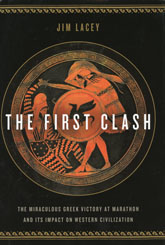
The First Clash The Miraculous Greek Victory at Marathon and Its Impact on Western Civilization
By Jim Lacey. 272 pp. Bantam Dell, 2011.
Reviewed by Debra Hamel
Twenty-five hundred years ago, in 490 BC, a Persian army landed at Marathon, roughly 25 miles northeast of Athens. King Darius had sent his armada west to punish the Athenians, who had helped the Greek cities dotting the western shore of Asia Minor revolt against Persia in 499, culminating in the burning of Darius’s capital at Sardis. The Athenians played only a minor role, but Darius had a long memory. After he suppressed the rebellion, the king took his juggernaut west: First Athens would fall, he imagined, then the whole of Greece would be assimilated into his vast empire.
Persia at the time extended from Egypt to India. Greece, by comparison, was tiny, with Athens a speck on the map. That the Athenians managed nonetheless to defeat the Persians at Marathon—and did so resoundingly: 192 men lost against 6,400 Persian dead—has seemed to many almost miraculous. Hence Jim Lacey’s choice for the subtitle of his new account of the battle.
A military analyst and former officer with the 82nd Airborne and 101st Airborne Divisions, Lacey has considerable practical experience to draw from, which means he can appreciate better than most what events must have been like on the ground. Lacey also defends historian Victor Davis Hanson’s view of a “Western way of war”—the principles of which made their debut at Marathon—that is superior to those of other cultures. Against the contention that the historical record is too fractured for a “way of war” to endure over time, Lacey argues that the continuity of civilization across the millennia suggests there has also been continuity in warfare. In particular, a military ethos can have been transmitted orally in the form of soldiers’ stories—distorted in the telling, perhaps, but replete with persistent themes.
One of Lacey’s main arguments is that “the deck was not as stacked against [the Athenians] as is typically assumed.” The Athenians weren’t just a bunch of armor-clad farmers, he says; they were armor-clad farmers tempered by decades of warfare so that Athens was “just as much a nation in arms as Sparta.” That comparison is hard to swallow: The Spartans, after all, did nothing but prepare for war, their land worked by the helots; the Athenians had day jobs. Still, we can accept Lacey’s point that the Athenians’ accomplishment at Marathon suggests a high degree of training and discipline. (Lacey’s claim that “what is truly remarkable is not that the Greeks won, but rather that any Persians left the Plain of Marathon alive” is surely hyperbole.)
Lacey also says the war archon Callimachus guided the Athenians at Marathon and deserves credit for victory. (Lack of evidence leaves the exact command structure open to debate.) Callimachus was the battle’s hero, he argues, but his death in the battle allowed others—chiefly Miltiades—to claim the laurels.
Lacey’s discussions of events not directly related to Marathon (the rebellions Darius quashed in the 520s, for example, and Pisistratus’s stints as tyrant in Athens) are sometimes too detailed. But on the whole the book makes for a solidly researched and engaging introduction to Marathon and its antecedents.
Debra Hamel is the author of Trying Neaira: The True Story of a Courtesan’s Scandalous Life in Ancient Greece. She is working on a book on Herodotus’s history of the Persian Wars.

